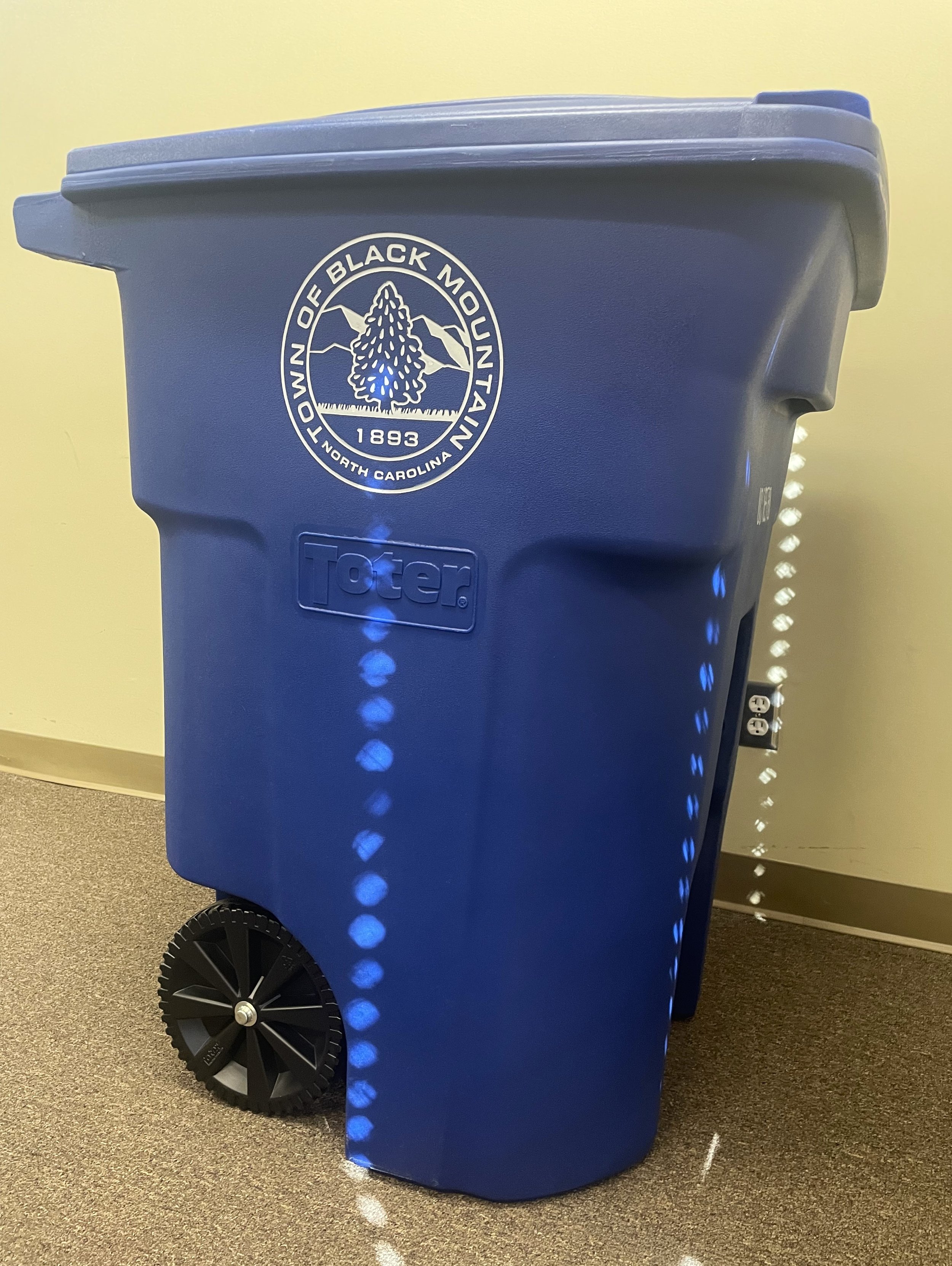Black Mountain to pursue grants for curbside recycling carts
Waste reduction measure would eliminate use of blue bags
Fred McCormick
The Valley Echo
February 21, 2023
The Town of Black Mountain will pursue a pair of grants supporting the acquisition of 96-gallon rollaway Toter carts for residents. Photo courtesy of the Town of Black Mountain
Black Mountain will pursue a pair of grants supporting the potential purchase of 96-gallon rollaway recycling carts for residents, following a 5-0 vote by the town council, in its Feb. 13 regular meeting. The waste reduction measure would eliminate the use of non-biodegradable blue bags and allow sanitation customers to dispose of recyclables directly into the receptacles.
The initiative, proposed by the Public Works Department and presented by Waste Reduction & Recycling Specialist Rechelle Ray, required the board’s approval to begin the application process.
Black Mountain is currently the only municipality in Buncombe County still utilizing blue bags for its recycling collection, according to Ray, who is seeking up to $76,800 in funding from The Recycling Partnership, a nonprofit organization that promotes improving recycling systems throughout the country. The department will apply for an additional $40,000 through the N.C. Division of Environmental Assistance and Customer Service (NCDEACS). If approved, the town would be required to contribute $236,000 to complete the purchase and distribution of Toter carts for all residents.
Encouraging use of the bins could help eliminate an estimated 244,000 plastic bags from the waste stream, while advancing a safer work environment for sanitation employees, according to Ray.
“A lot of people currently use the small bins, so sanitation workers have to bend over to lift those, manually,” she said. “We’ve already invested in cart tippers on our trucks, so over time, you could see a decrease in insurance premiums and compensation claims.”
The Town of Black Mountain established a sanitation department in 2020, and currently provides bi-weekly recycling collection for an estimated 4,700 households, before transporting the materials to Asheville-based Curbside Management, commonly known as Curbie.
“Blue recycling bags are not recyclable, and considered a contaminant by Curbie,” Ray said. “Approximately 70% of the contaminants at Curbie are plastic bags, and they spend about $10,000 per month removing those contaminants.”
A projected timeline for the implementation of the initiative indicates the Toter carts could be distributed to residents this fall, following the approval of the 2023-24 town budget. Switching to recycling carts, Ray added, would initially save the town approximately $11,000 per year.
“The Toter carts were recommended by the state and by Curbie, because they have a 12-year warranty and, on average, the carts they provide last 15-20 years, as opposed to 5-10 with competitors,” she said. “It is an investment right now that would eventually save the town money.”
Waste reduction represents an important issue within the town, according to Councilmember Pam King, who was supportive of the recommendation.
“It’s pretty obvious we have a lot of folks in town who aren’t recycling yet, so whatever we can do to make it easier and more convenient for people is a good thing,” she said. “We need to encourage people to do everything they can. Really, everybody who doesn’t recycle, at this point, is costing the town money.”
There is a lot to like about the idea, councilmember Alice Berry told Ray, before expressing concerns for residents who may struggle to move the large bins across steep terrain.
“I did hear from a citizen, who was probably not in a unique situation, and received this as a hardship to get the cart up and down their driveway, which is on an incline,” she said. “So, it sounds like there could be options where it doesn’t have to be one size fits all.”
Sanitation workers could address those concerns on a case-by-case basis, Ray replied.
“In general, though, I’ve used these types of carts and they can wheel a lot without being too much of a hassle,” she said. “But, all residents could have the option of having them.”
King asked Town Manager Josh Harrold about financing options for the purchase of the carts.
“I looked at four- and five-year terms, and I don’t think we would need to go that long if we’re only going to be borrowing $240,000,” said Harrold, who participated in the meeting virtually. “With a four-year term, you’re looking at probably around $60,000 per year, and in a five-year term it would be approximately $48,000.”
The available options will likely be discussed in the upcoming budget season, said Councilmember Bill Christy, as the board voted unanimously to pursue both grants.

